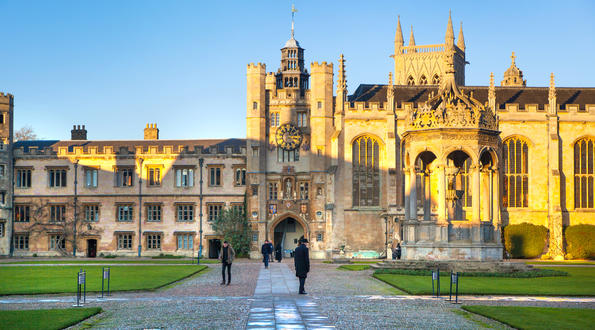Whether Russell Group universities are the best continues to loom in the highly competitive world of higher education.
These prestigious institutions have long enjoyed a significant position thanks to their prestigious reputation and powerful network.
However, investigating the elements contributing to this impression becomes increasingly important as students weigh their alternatives and navigate the complicated world of university rankings and league tables.
This article covers everything you need to know about Russell Group universities, including their history, membership requirements, and a critical evaluation of whether they actually provide unmatched academic brilliance.
Table of Contents
- What is The Russell Group?
- What is the History of the Russell Group of Universities?
- Why Study at a Russell Group University?
- Benefits of Attending a Russell Group University
- How Can you Submit an Application to Russell Group universities?
- What are the Various Russell Group Universities Ranking?
- FAQs
- Conclusion
- Reference
- Recommendations
What is The Russell Group?
The Russell Group is a coalition of 24 outstanding British institutions known for their active research environments. Since its founding in 1994, the organization has significantly influenced higher education policy and advanced research across various fields.
Its members include some of the world’s greatest universities, such as Oxford and Cambridge, and institutions like Imperial College London and the University of Manchester.
The Russell Group’s dedication to necessary research is one of its defining characteristics. These universities, renowned for creating ground-breaking findings and cutting-edge innovations, draw top scholars worldwide who work together across institutions to address global concerns.
Additionally, membership in The Russell Group grants member institutions access to a wide range of financing options for cutting-edge research initiatives, enabling them to maintain their leading positions in the field of knowledge.
The Russell Group universities are known for their reputation for academic quality and research prowess, but they also provide a vibrant student experience.
Students can benefit from knowledgeable teaching staff who are frequently leaders in their respective professions and a wide range of course offerings from the humanities to the sciences, engineering, and arts.
Additionally, having links to The Russell Group gives students access to cutting-edge resources and facilities that support a dynamic learning environment. These colleges also frequently have close ties to businesses and industry partners, which improves graduate job prospects.
Read Also: What are Academic Transcripts and How Do You Get Them
What is the History of the Russell Group of Universities?
To advance their shared interests and lobby for more funding and recognition, fourteen British universities joined in 1994 to form the Russell Group of Universities. The Hotel Russell in London, where the inaugural meetings were held, inspired the name Russell Group.
Since its establishment, the association has grown to include 24 prestigious universities with a strong focus on research from around the United Kingdom.
In 2001, the Russell Group successfully lobbied for more government financing for R&I, marking a significant turning point in its history.
As a result, the group’s standing as a strong voice inside higher education policy circles was greatly enhanced.
Being part of the Russell Group is now a prized distinction for institutions hoping to boost their standing and attract the best professors, students, and research collaborators.
Despite its success, the Russell Group has been criticized for what some see as its preference for prestigious universities over smaller ones.
Critics claim that this concentration of resources may make it more difficult for those from varied social or geographic origins to enter higher education.
Nevertheless, the Russell Group’s history is still being written with substantial consequences for UK higher education, given its prominent role in influencing national policy on research and teaching.
Why Study at a Russell Group University?
Studying at a Russell Group university has several advantages besides just getting a degree. Because of these colleges’ academic greatness and research prowess, you’ll be learning from some of the top experts in your field.
These universities’ demanding curricula and strong standards will push you to reach new heights intellectually and encourage the growth of your mind.
Another benefit of attending one of Russell Group universities’ institutions is the numerous opportunities for networking and career growth.
These universities can assist you in finding worthwhile internships, placements, and employment opportunities because of their solid connections with businesses, organizations, and governments.
Russell Group institutions frequently have sizable and influential alumni networks. This network may provide access to job openings or mentorship programs only open to graduates of these esteemed institutions.
Additionally, attending a Russell Group university gives you access to cutting-edge research resources and cutting-edge facilities.
Using these tools, students can participate in practical learning experiences and work with top researchers in various subjects to conduct ground-breaking research projects. Such exposure improves your educational experience and equips you with the skills and information necessary to tackle problems head-on in the future.
Finally, choosing a Russell Group university for your studies is a wise investment in your education that will pay you both academically and professionally.
Personal development thrives in an environment where students learn from renowned faculty members, network with business leaders, and utilize state-of-the-art facilities and resources.
Benefits of Attending a Russell Group University
Choosing which university to attend is essential, and selecting a Russell Group institution has various advantages. The following are some solid arguments for why a lot of students want to attend Russell Group universities:
#1. Academic Prowess and Credibility
Universities in the Russell Group are recognized for their high academic standards. Thanks to the stringent admissions process, students accepted to these universities are among the smartest and brightest. This learning atmosphere encourages pupils to challenge their intellectual limits and develop healthy competitiveness.
#2. Research Possibilities
One of the Russell Group universities’ defining characteristics is its concentration on research. Students can participate in cutting-edge research initiatives, collaborate with eminent scholars, and develop numerous fields.
#3. A Variety of Programs
The Russell Group universities provide a wide range of courses in the humanities, sciences, engineering, and other fields. This diversity allows students to explore existing hobbies and develop new ones.
#4. Connections and Networking
Students who attend a Russell Group university get access to a huge network of alumni, professors, and business executives. These relationships may be useful for future work possibilities and partnerships.
#5. Materials and Equipment
Universities in the Russell Group frequently have cutting-edge facilities, libraries, and research centers, giving students the tools they need to succeed in their academic and research activities.
Read Also: Top 15 Head Boy Ideas to Improve School: Ways We Can Improve Schools Today
How Can you Submit an Application to Russell Group universities?
The procedure for applying to Russell Group universities is the same as for other UK universities. The following are the standard procedures for applying to UK Russell Group universities:
#1. Examine and select universities
First, research the Russell Group universities that offer the courses or programs you are interested in. Before choosing a university, consider variables like course content, location, facilities, and reputation because each one may have unique strengths and areas of specialty.
#2. Verify the prerequisites
Examine the prerequisites for the courses in which you are interested. Standardized test scores and competitive admittance standards, such as minimum grade requirements in particular disciplines, are standard at Russell Group universities. Ensure you fulfill the prerequisites for the course you want to enroll in.
#3. UCAS submission
The Universities and Colleges Admissions Service (UCAS) is used in the UK for the majority of undergraduate admissions to universities. Complete the online application form after creating a UCAS account. Up to five courses at various universities, including Russell Group institutions, may be applied for.
#4. Individualization
Create an engaging personal statement as part of your UCAS application. This is your chance to highlight your accomplishments, interests, and reasons for pursuing the subject of your choice. Customize your statement for each university and course you apply to.
#5. Character references
Reference letters from professors or mentors who can vouch for your academic prowess and aptitude for the program you’re applying to are required. Usually, your school or college will offer these recommendations.
#6. Application closing dates
Keep track of application deadlines. Most programs have UCAS application deadlines sooner than other universities, especially Russell Group universities. Many undergraduate courses have deadlines around the middle of January, although it’s wise to check the websites of individual universities for precise dates.
#7. Admissions tests or interviews
Some courses and universities may ask you to participate in interviews or aptitude tests as part of the admissions process. If necessary, be well-prepared for these.
#8. Decisions and offers
Universities will review your application after you submit it and may make conditional or unconditional offers based on your credentials and other circumstances. You can accept or reject offers through UCAS.
Read Also: What Are Level 4 Qualifications Equivalent in Grades in the UK?
What are the Various Russell Group Universities Ranking?
Although each Russell Group university is distinct and has a rich history, they all share the same objectives and fundamental traits. The following is a list of the 24 Russell Group universities:
- University of Birmingham
- University of Bristol
- University of Cambridge
- Cardiff University
- Durham University
- University of Edinburgh
- University of Exeter
- University of Glasgow
- Imperial College London
- King’s College London
- University of Leeds
- University of Liverpool
- London School of Economics and Political Science
- University of Manchester
- Newcastle University
- University of Nottingham
- University of Oxford
- Queen Mary University of London
- Queen’s University Belfast
- University of Sheffield
- University of Southampton
- University College London
- University of Warwick
- University of York
List of Best non-Russell Group Universities
Here is a list of some prominent non-Russell Group universities in the UK:
- University of St Andrews – Known for its strong focus on research and a prestigious reputation, particularly in arts, humanities, and sciences.
- Lancaster University – Recognized for its high-quality research and teaching, with management, sociology, and physics strengths.
- University of Bath – Renowned for its engineering, architecture, and management programs, as well as its strong emphasis on research.
- University of East Anglia (UEA) – Known for its creative writing, environmental sciences, and international development programs.
- University of Reading – Offers a range of strong programs, including agriculture, real estate, archaeology, and more.
- Heriot-Watt University – Especially strong in engineering, business, and related fields, with a global outlook.
- University of Leicester – Notable for its space exploration, archaeology, and genetics research.
- Royal Holloway, University of London – Known for its excellence in arts, humanities, and social sciences.
- University of Surrey – Recognized for its engineering, hospitality, and tourism programs.
- Aston University – Strong in business, engineering, and applied sciences.
- University of Kent – Known for its social sciences, arts, and humanities programs.
- Brunel University London – Solid in engineering, design, and related disciplines.
- The University of Essex Offers a wide range of humanities, social sciences, and sciences programs.
- University of Dundee – Renowned for its life sciences, law, and art programs.
- University of Stirling – Known for its sports science, film, and media programs.
Read Also: What is Uni Grades? The University Grading System Explained
FAQs
While research is significant, Russell Group universities prioritize high-quality teaching to provide a balanced educational experience.
Admission is competitive, but meeting the entry requirements and demonstrating your passion for your chosen field can increase your chances.
Russell Group universities welcome applications from students worldwide, contributing to a diverse and global learning environment.
These universities are spread across various regions in the UK, offering both urban and campus-style settings.
Each university has its own areas of expertise, so it’s essential to research which institution aligns best with your academic interests.
Conclusion
The status of being a Russell Group university does hold some weight in terms of reputation and research output. These institutions have consistently demonstrated their commitment to excellence in higher education.
However, it is essential to consider that the best school for an individual may not necessarily be the Russell Group institution.
Factors such as course offerings, location, campus culture, and personal fit should also be considered when deciding on higher education. Ultimately, prospective students should conduct thorough research and consider their priorities before deciding which university best fits them.
Reference
- Edvoy.com ____ Should I study at a Russell Group university?
- Thinkstudent.co.uk ______ Are Russell Group Universities The Best?
- Universitycompare.com _____ What are the Russell Group Universities?
- Meridean.org _____ Best Russell Group Universities in UK (Apply to 2024)




